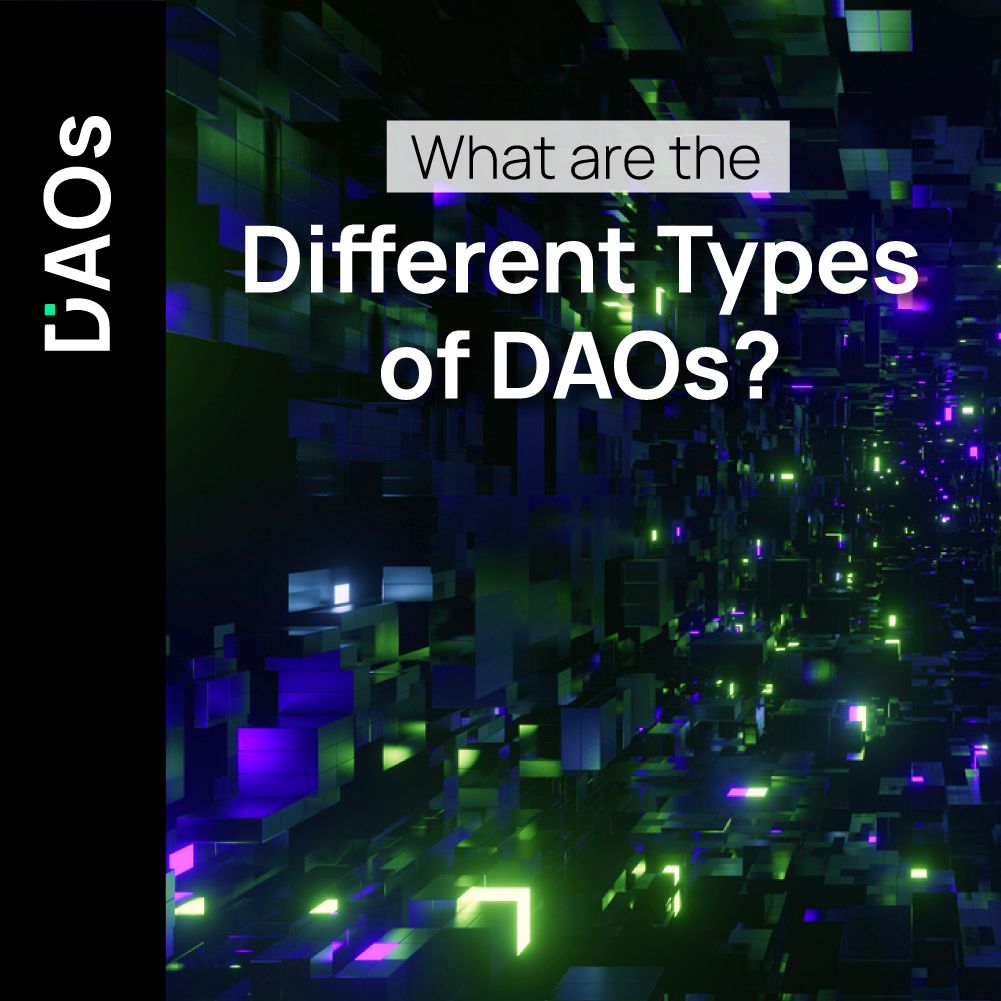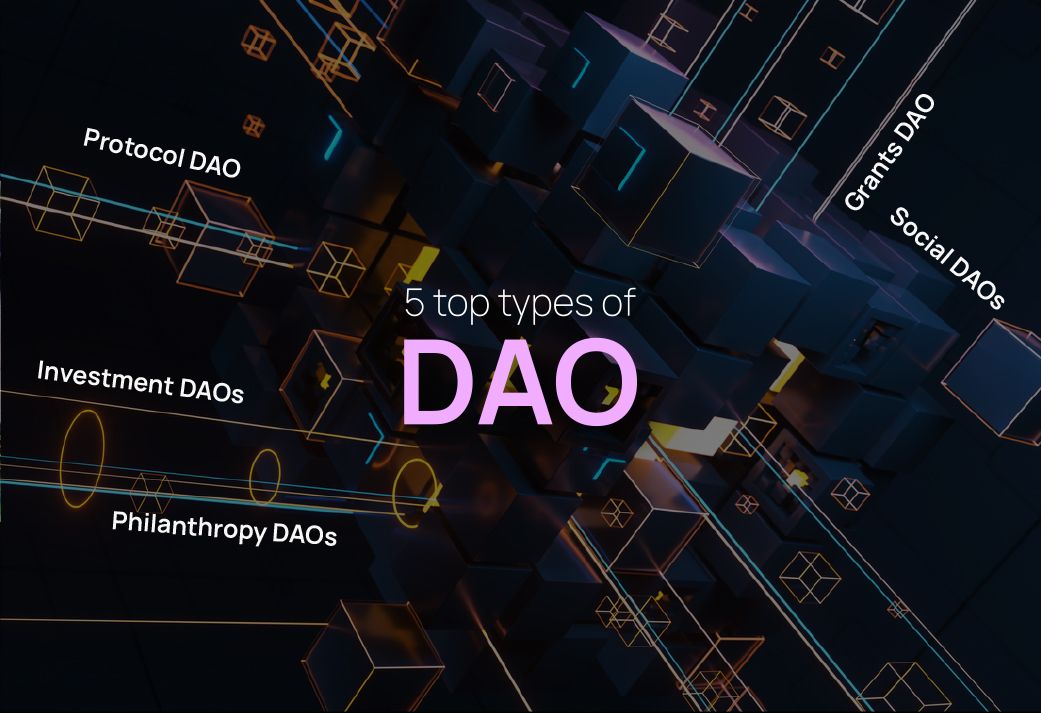03: Know the different types of DAOs

Key characteristics, use cases and examples
Those who are familiar with the crypto world are closely watching the development of DAOs or decentralized autonomous organizations. These organizations leverage blockchain technology in an effort to improve the way organizations function in our world by integrating the efficiency, transparency and autonomy of blockchains into traditional corporate organizations.
What is a DAO?
Decentralized autonomous organizations operate based on smart contracts written on the blockchain. The blockchain is transparent, and the organization’s rules are automated using software. The members take care of finances, and there are no central authorities or third parties involved.
How does a DAO operate?
DAOs have a foundation rooted in a clear, aligned goal. Once the goal is decided, the founders decide on the sources of revenue. Dividends help DAOs generate the income necessary to run them. By dividing the ownership among members, the community aspect stays in balance. DAO crypto tokens are the most common way of doing this. Next, DAOs need to choose the governance method, usually voting by members. Finally, the DAO decides how its members will receive rewards and incentives.
Types of DAOs
The potential applications of DAOs are endless. Here we list out the most popular types of DAOs with examples in each category.
Protocol DAOs
Decentralized protocols, such as borrow/lending applications, decentralized exchanges, or other types of dapp are sets of well-designed, trustworthy instructions stored on a blockchain. Protocol DAOs are used to govern them. These types of DAOs allow people to use the protocol to deliver various services.
Examples
The MakerDAO lets users borrow and lend cryptocurrency with the help of smart contracts. It provides repayable amounts and custom lending rates.
Uniswap is another well-known DAO that helps other protocol-based DAOs using its native DAO token UNI.
Grant DAOs
Grant DAOs facilitate non-profit donations, strategically deploy capital assets throughout the web3 ecosystem, and are either a charitable extensions of a larger project or an entirely separate entities in the DeFi space.
Examples
Aave Grants DAO funds projects and ideas with the potential to grow the Aave protocol along with supporting the community developers' networks. The DAO accepts submissions to acquire grants for projects related to Aave developer tools, integrations, and development.
MetaCartel DAO is a separate entity that funds budding projects and early-stage decentralized apps. It allots $1,000 to $10,000 to dapps on the Ethereum blockchain, new DAOs, and new community-based ventures.
Philanthropy DAOs
This label covers a vast array of DAOs used as vehicles for 'giving.' Exciting models are emerging, ranging from the facilitation of giving cryptocurrencies to the development of new and sustainable models of giving. Philanthropy DAOs come with the purpose of social responsibility and strive to bring change in the world using the Web3 ecosystem.
Examples
The Big Green DAO is the first philanthropic DAO that falls under Big Green, a food justice charity. The DAO helped the non-profit organization to obtain grants more efficiently and effectively brought a restructure within the charity sphere.
Another recent example is the UkraineDAO. Built to support the Ukrainian Army, the UkraineDAO raised $3 million in under a week.
Social DAOs
Social DAOs bring like-minded people together and pursue projects that matter to the community, coordinated around a token. Typically there may be entry criteria to joining such as a DAO - such as ownership of native DAO tokens or NFTs or receiving a personal invite.
Examples
Friends with Benefits DAO is the most famous social DAO. It brings artists and unique thinkers with a similar vision under the same umbrella, providing a shared space to interact and collaborate. The native DAO crypto token FWB governs this DAO.
Collector DAOs
Collector DAOs allow members to pool their assets to invest in collectibles such as NFTs. The community owns the collectible, so each member owns a share in proportion to their investment.
Examples
FlamingoDAO is a collector DAO that originated with the rise of NFTs and collected expensive NFTs.
Another collector DAO is the ConstitutionDAO which was made to buy the American constitution and even raised $47 million equivalent in eth to buy it.
Venture DAOs
Venture DAOs raise investments for blockchain startups, crypto projects, off-chain investments, protocols, and more. These DAOs open the doors to a new world of possibilities otherwise unavailable in traditional finance.
Examples
MetaCartel Ventures is a sub-DAO of Metacartel DAO that provides investments to developing dapps.
Another venture DAO is the BessemmerDAO which discusses crypto trends and shares resources.
Media DAOs
Rather than rely on advertising-based revenue models, these DAOs use token incentives to reward producers and consumers for their time with an ownership stake in a given outlet, thereby reinventing how content producers and consumers engage with media.
Existing media platforms follow a top-down approach with a central authority making all the calls and getting paid by advertisers. Media DAOs change this by letting the community drive the content and rewarding the contributors with native tokens while removing advertisers from the picture.
Examples
BanklessDAO is a community that supports and propagates bankless culture, art, media, and education. Its mission is to reach a completely bankless system for money.
Decrypt is a Media DAO that allows its community to vote over the type of content distribution they want.
SubDAOs
SubDAOs are the subsets of DAOs with specific duties like operations, grants, marketing, collaboration, and treasury.
Example
Balancer DAO is a subDAO of Balancer Protocol dedicated to decision-making and execution without the need for the whole DAO to pass it. The formation of this subDAO increased the efficiency of the entire DAO.

Conclusion
We are still at the start of the DAO journey, and these examples offer just a glimpse of what may be to come. With DAOs gaining worldwide acceptance, people will continue to see their positive effects first-hand, and decentralized organizations are likely to have a large future impact across businesses and sectors.

